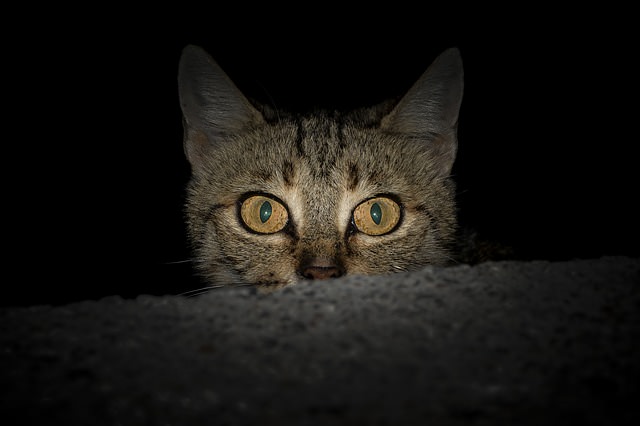Every cat lover has had it happen. You reach out to touch your cat and seem to startle her and she really jumps. She might even run away.
We even have jokes about how jumpy cats can be because they don’t just react a little bit – they seem to react violently. Ever wonder why cats are so reactive?
We know that cats can smell, hear, and see better than we can, and this must mean that something unsettling is actually more distressing to a cat than we can even perceive.
Cats are, by nature, somewhat solitary hunters, and they know that they must depend on themselves (rather than a pack or herd) for their own survival. Their ability to react sufficiently and quickly to danger can mean the difference between life and death. When cats lurk and stalk, they are making themselves vulnerable to other larger predators that are also on the hunt.
Some people believe this is why cats have become crepuscular (alert at dusk and dawn). A crepuscular lifestyle is thought to have evolved to drive cats to be awake and hunting at times when other larger and more dangerous hunters are not. Some of these threats are completely nocturnal and cats would rather be safely tucked away during their prime hunting time.
Cats are defined by their genetics and evolution as a successful species. Their reaction time is another way that they can protect themselves. They must respond to threats or even perceived threats because the alternative is not a good one. If your cat failed to react to the cucumber on the floor and it turned out to be a snake, he might pay the price. It is far better to overreact than under-react in cases where the outcome is your demise.
A cat’s reaction time is very rapid, almost like a reflex that happens without complete thought or planning, and it is an evolutionary advantage in the wild. However, if your cat seems excessively afraid in your home, she might be suffering from an anxiety disorder or imbalance in her brain chemistry. Ask your veterinarian to help you differentiate between normal cat alertness and life-altering anxiety. There are strategies and medications that can restore your cat’s quality of life if she’s suffering.
We don’t call them “scaredy cat” for nothing. Normal cats quickly assess and react, but can return to a normal arousal level once the threat has passed. If your cat seems tormented by her fear or she is hiding all of the time because of her fear, then it is impacting her quality of life. If you know in your heart that your cat is more than just a “scaredy cat,” ask your vet for help.
Do you love cats? Get in on the cat-versation with me and other cat people on Facebook by clicking here!


